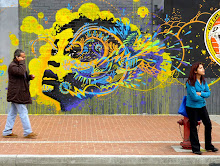"Our task must be to free ourselves from this prison by widening our circle of compassion to embrace all living creatures and the whole of nature in its beauty." -Albert Einstein
Four years ago, a rural poet named Antler came to give a guest lecture at our school. He explained why he chose to live his entire life in the wilderness by the coast of the Eagle River. When he was in high school himself, he found that he could befriend Walt Whitman. Whitman had been long dead, but the content of his thoughts were inhabitable to the quiet, introspective soul of Antler. Using this inspiration, Antler became a Source of awareness in a timeless fashion himself. In his poem "What the God Says Through Me," Antler writes:
"No other sound but the loon,
And the night wilderness smells of September,
This is the place to hear my voice."
"They used to say that Thelonius Monk was ahead of his time. He wasn't understood in the 1940's. Now it is some of the most elaborate and intricate music available. Now is his time."
When translating Latin poetry into English, A.D. Melville says:
"I have lived with Ovid in the Metamorphoses for a number of happy years."
The word fontis means "Fountain" in latin. According to "A Dictionary of Symbols," The fountain can be found in architecture within a cloister, garden, or patio with a central position, particularly during the Romanesque or Gothic periods of symbolist tradition. Psychologist Carl Jung calls the central garden fountain a representation of individuality, strength in adversity, and hallowed ground. Fountains are the Source of life-giving water, and in this way, humans may become fountains when their works become inhabitable to others.
Marble Courtyard of the Attarine Medersa, France
To become a Source of warmth and guidance to others, we must first be empowered by the imaginations of those who embedded their personalities through a medium of art preserved through time. If nature is the ultimate inspiration, then the next goal for every aspiring soul is to choose the paths that will yield the most generation of inspiration to others.
To put it bluntly, editor/author Jerry Phillips writes:
"The higher purposes of nature lay in Beauty. It is the artist who can convey, indeed remind, all people of their ability to see the beauty inherent in all things.”
To put it bluntly, editor/author Jerry Phillips writes:
"The higher purposes of nature lay in Beauty. It is the artist who can convey, indeed remind, all people of their ability to see the beauty inherent in all things.”
Though Einstein was arguably among the greatest geniuses in history, he too was in awe of the magnificence of ideas and creation. He writes:
"Imagination is more important than knowledge."
The most powerful emotions ever recorded on record might be considered to be the struggle-soaked blues of Janis Joplin. Early in her singing career with Big Brother And The Holding Company, she let the gritty, yet fluid vocals take their fill to the sweet, agony-tinged song "Take Another Piece of my Heart". The Source of her words are honest, authentic, and passionate. Her final recording sessions of the song "Buried Alive In The Blues" were never used - the song was modified to an instrumental. The raw, stagnant vocals must be imagined by the seasoned listener who has fondly befriended the wily Janis many atime before. Though she died at the age of 27 of a heroin overdose, her youthful, passionate coo continues to scratch through the gentle surface of time.

Any materialization of life within the medium of expression can become inhabitable. With the guidance offered by individuals of blooming personalities, our own inner frameworks can take personification. Lebanese poet Khalil Ghibran says in The Prophet:
“Say not, I have found the path of the soul. Say rather, I have met the soul walking upon my path. For the soul walks upon all paths. The soul walks not upon a line, niether does it grow like a reed. The soul unfolds itself like a lotus of countless petals."
The central core of the "inner framework" of our feelings is our Source. Self-expression, therefore, is a gateway to communication beyond thoughts. Once the Source is established, inner expansion of the life-embodying expression soul.

Any materialization of life within the medium of expression can become inhabitable. With the guidance offered by individuals of blooming personalities, our own inner frameworks can take personification. Lebanese poet Khalil Ghibran says in The Prophet:
“Say not, I have found the path of the soul. Say rather, I have met the soul walking upon my path. For the soul walks upon all paths. The soul walks not upon a line, niether does it grow like a reed. The soul unfolds itself like a lotus of countless petals."
The central core of the "inner framework" of our feelings is our Source. Self-expression, therefore, is a gateway to communication beyond thoughts. Once the Source is established, inner expansion of the life-embodying expression soul.
To end the barrage of quotations with a dense paragraph, Hierarchy Theorist Joseph Tainter writes:
"A culture is born in the moment whe a great soul awakens out of the proto-spirituality of ever-childish humanity, and detaches itself, a form from formless, a bounded and mortal thing from the boundless and enduring. It blooms on the soil of an exactly definable landscape, to which plant-wise it remains bound. It dies when this soul has actualized the full sum of its possibilities in the shape of peoples, languages, dogmas, arts, states, sciences, and reverts into the proto-soul. It is an inner passionate struggle to maintain the Idea against the powers of Chaos."
Have you found your Fountains?














No comments:
Post a Comment